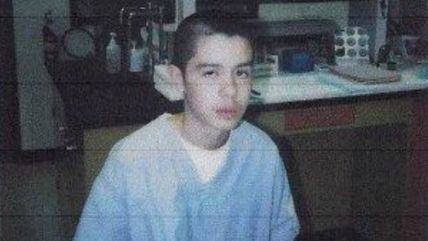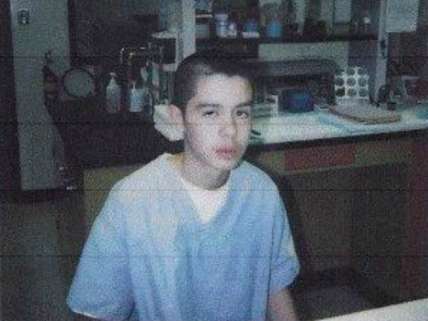Denver Man Sues, Says He Was Pressured To Confess To Murder at 14
Lawrence Rubin Montoya served more than 13 years in prison before his conviction was overturned.


Thirteen years, seven months, and thirteen days: That is the time Lawrence Rubin Montoya spent in prison for a crime he did not commit.
Montoya was sentenced to life in prison in November 2000 for allegedly murdering a Denver school teacher, despite no evidence linking him to the crime. Montoya was 14 years old at the time of the murder. In June 2014, his conviction was overturned thanks to DNA retesting of evidence.
Now, the 31-year-old is suing the city of Denver and members of the city's police department in federal court for $30 million, citing the interrogation procedures used on him and failures by the district attorney's office to investigate Montoya's innocence. His lawyers are requesting a trial by jury.
On January 1, 2000, Emily Johnson was found beaten and barely breathing in her backyard. She had been assaulted by Nicholas Martinez, Luke Anaya, and Lloyd Martinez shortly after arriving home the previous night from a New Year's Eve party. Johnson's Lexus was then stolen by the group.
During the attack, Montoya was asleep at his girlfriend's house. It was not until the afternoon of January 1 that he interacted with anyone involved in the assault, when Nicholas Martinez picked up Montoya and several others in the stolen Lexus.
Montoya was introduced to Martinez by Montoya's cousin, who was also riding in the car—the first and only time he and Martinez interacted.
Not a single witness or suspect who talked to Denver detectives implicated Montoya in Johnson's death or the stealing of the Lexus, and there was no physical evidence tying him to the attack except for his fingerprints on one of the car's doors.
Regardless, Montoya was taken to the Denver Police Department Headquarters on January 10, at which point detectives tried to connect him to the act. As the lawsuit filed by Montoya's lawyers states:
During the course of the more than two and a half hour interrogation, Lawrence was coerced and intimidated by Defendants who used, among other techniques known to cause false confessions including false evidence ploy, manipulation, minimization, threats, false promises and other coercive tactics such as, cornering Lawrence against the wall in his chair, getting in his face, banging on the table, yelling at him, standing over him, telling him he is not going home, telling him he is going to prison for life, telling him he should be afraid, and telling him to say goodbye to his mother.
Montoya denied being at Johnson's home or stealing her car 65 times before finally confessing. That statement, given under duress, was the basis for the "probable cause" of his arrest.
According to the lawsuit, one detective shown in the interrogation video knew Montoya was not being honest when he confessed:
Defendant Jonathan Priest suggests he knows Lawrence is lying, yet nonetheless, his statements are used later as the sole basis for probable cause to arrest: "?[w]e are here busting our butts to save your ass and all you are giving us is this song and dance and bullshit story. It's getting old. You're giving us what you think we want to hear. You don't have a fucking clue what we can prove. Your ass is hanging out big time. You should think about what is going to happen because we know what is going to happen."
Montoya was sentenced to life in prison in November 2000 as a minor. As his lawyers point out in the lawsuit, he was subjected to cruel treatment while serving his sentence. He was threatened with rape and molestation and placed in solitary confinement. He's suffered from severe mental distress stemming from his unjust prosecution and false imprisonment.
Moreover, although Montoya continued to profess his innocence, the Denver District Attorney's Office refused to conduct any further DNA testing. It took a court order to force the test, which led to the conviction being overturned. Yet the district attorney still argued against letting Montoya free, claiming he acted as a lookout during the 2000 assault, which goes against the original charges against him.
Montoya was bullied into giving a confession for a crime he did not commit. A fair and functioning justice system would have given him due process to prove his innocence. Instead, he was victimized himself—arrested without probable cause and abused while in custody, a clear violation of his constitutional rights. His teenage and early adult years are gone, and the same justice system that failed him 16 years ago is now responsible for deciding whether he deserves compensation.
Editor's Note: As of February 29, 2024, commenting privileges on reason.com posts are limited to Reason Plus subscribers. Past commenters are grandfathered in for a temporary period. Subscribe here to preserve your ability to comment. Your Reason Plus subscription also gives you an ad-free version of reason.com, along with full access to the digital edition and archives of Reason magazine. We request that comments be civil and on-topic. We do not moderate or assume any responsibility for comments, which are owned by the readers who post them. Comments do not represent the views of reason.com or Reason Foundation. We reserve the right to delete any comment and ban commenters for any reason at any time. Comments may only be edited within 5 minutes of posting. Report abuses.
Please to post comments


Holy shit.
Maybe it should just be illegal for the police to interrogate anyone without an attorney present unless they sign something waiving the right to an attorney. And for minors, they shouldn't be allowed to question them at all without a lawyer or at least a parent present.
Also, if it turns out that a false confession was obtained through police coercion, then the police officers involved have to serve the sentence that was given to their victim.
This.
Also any convict subsequently found to be provably innocent results in automatic suspension of the law license of the prosecutor and he has to prove both that there was no misconduct on the part of the prosecution to get it back.
I fully agree. Anyone who obstructs justice under color of authority should get the maximum punishment of the crime at stake.
What I hate about these crimes more than anything is the cavalier attitude about ruining one innocent life AND letting the real criminal go free.
The fuckers involved should spend at least the same amount of time in jail as this kid did.
Prison, not jail.
PMITA FCI
Exactly.
Now, the 31-year-old is suing the city of Denver and members of the city's police department in federal court for $30 million, citing the interrogation procedures used on him and failures by the district attorney's office to investigate Montoya's innocence.
He's been out of touch with the real world for a while now, so he can be forgiven his naivete. His attorneys, however, should know better than to try something so fruitless. The courts demand no accountability for prosecutors or law enforcement. In fact, they're quite well shielded from it.
And the same prosecutors who are all about punishing all criminals all the time will not bother prosecuting anyone involved in this travesty.
The Reid Technique ?
This is serious business, no Princess Bride jokes yet!
So on a serious note, if even having a cop's bosses ask him about possible work-related crimes is coercive, such that even asking the cop questions is unconstitutional (source: constitutional scholar dunphy), then I would imagine that having a bunch of cops tag-team a teenager is in and of itself evidence that they're coercing a confession.
When did the self-incrimination clause of the Fifth Amendment get repealed?
If you recall, SCOTUS ruled we have to invoke our 5th amendment right to remain silent lest our silence be used against us in a court of "law".
Was it that, or was it that invoking your 5th Amendment rights means that you aren't remaining silent, so invoking the 5th waives the 5th?
RE: Denver Man Sues, Says He Was Pressured To Confess To Murder at 14
Lawrence Rubin Montoya served more than 13 years in prison before his conviction was overturned.
If The State cannot coerce a 14 year old into confessing to a murder he didn't do, then who can they force a false confession from?
Did the court ever think of that?
it's amazing to me that 'factual innocence' isn't grounds for appeal. the system still, after all the examples to the contrary, doesn't realize that it can simply fail.
A fair and functioning justice system would have given him due process to prove his innocence prosecuted the police who interrogated him and the DA who put him on trial.
If it were me, after I got my settlement, I would spend my spare time destroying the life and career of the prosecutors involved. I would dig up every skeleton in their closet, investigate any potential misconduct on any case in which they were involved. I would find any faults in their personal lives and use it to destroy their family life.
These kinds of prosecutors need to be made afraid of this kind of misconduct. If the ay aren't going to be prosecuted, than this is the alternative.
Vote WoodChipper 2016
For a Fair and Functioning Justice System